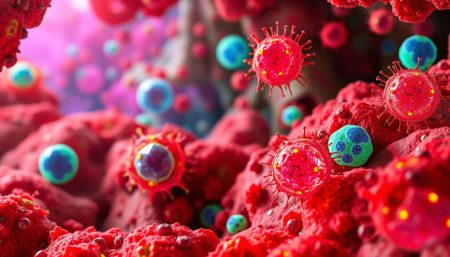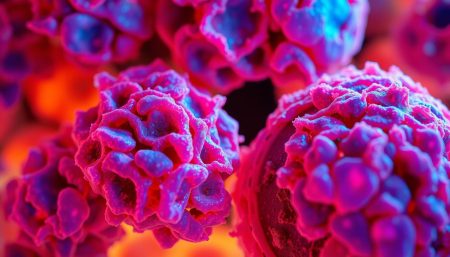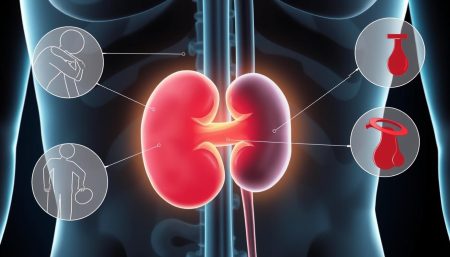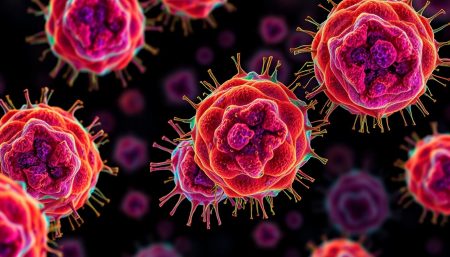Cervical cancer often starts quietly, making it key to spot its early signs. Knowing these signs can help catch the disease early. Look out for abnormal vaginal bleeding, which can happen between periods or after menopause.
Pelvic pain is another important sign. It might feel like a dull ache or sharp cramps. If you notice unusual discharge or pain during sex, see your doctor. These symptoms might seem small, but they could signal a serious health issue.
Regular check-ups and screenings are your best defense. Don’t wait for symptoms to get worse. If something feels off, get medical advice. Early detection of cervical cancer can lead to better treatment and outcomes. Stay informed and take care of your health.
Understanding Cervical Cancer Symptoms: A Guide
Spotting cervical cancer symptoms early can save lives. This guide explains the signs to look out for and why catching it early is key.
What Defines Early-Stage Symptoms
Early cervical cancer often shows no symptoms. This is why regular screenings are vital for early. When symptoms do show up, they might include:
- Unusual vaginal bleeding
- Pelvic pain
- Pain during sex
- Watery or bloody vaginal discharge
Why Early Detection Matters
Finding cervical cancer early can greatly improve treatment success. Regular Pap tests and HPV screenings can spot abnormal cells early. This allows for quick action.
Risk Factors to Consider
Knowing your risk factors is important for prevention. Some common risks include:
| Risk Factor | Description |
|---|---|
| HPV infection | Most common cause of cervical cancer |
| Smoking | Increases risk and weakens immune system |
| Multiple sexual partners | Increases chance of HPV |
| Early sexual activity | Raises HPV infection risk |
By learning about cervical cancer symptoms and risks, you can protect your health. Regular screenings and healthy choices are key.
Abnormal Vaginal Bleeding as a Primary Warning Sign
Abnormal vaginal bleeding is a key cervical cancer symptom that shouldn’t be ignored. Understanding different types of unusual bleeding can help you recognize when to seek medical attention.
Spotting Between Periods
If you notice light bleeding or spotting between your regular menstrual cycles, it could be a sign of cervical cancer. This type of bleeding often occurs unexpectedly and isn’t related to your normal period. Keep track of any unusual spotting and discuss it with your doctor.
Post-Menopausal Bleeding
Women who have gone through menopause should be alert to any vaginal bleeding. Even a small amount of blood after menopause is considered abnormal and warrants immediate medical evaluation. This symptom can be an early indicator of cervical cancer or other serious conditions.
Bleeding After Sexual Intercourse
Experiencing bleeding after sex is not normal and should be taken seriously. This cervical cancer symptom might appear as light spotting or heavier bleeding. If you notice this occurring consistently, schedule an appointment with your healthcare provider for a thorough examination.
Remember, while abnormal vaginal bleeding can be a cervical cancer symptom, it doesn’t always mean you have cancer. Many other conditions can cause similar symptoms. The key is to pay attention to your body and seek medical advice when you notice unusual changes.
Recognizing Changes in Vaginal Discharge
Vaginal discharge is a normal part of life. But, if it changes in color, smell, or amount, it could mean something’s off. This might include signs of cervical cancer.
Women should watch for these changes in vaginal discharge:
- Color: Discharge that appears watery, brown, or tinged with blood
- Consistency: Thick or sticky discharge that persists
- Odor: Strong or unpleasant smell accompanying the discharge
- Frequency: Increased amount of discharge that’s unusual for you
These changes don’t always mean cervical cancer. But, they do need attention. If your discharge keeps changing and doesn’t get better, see your doctor.
It’s important to know the difference between normal and abnormal changes. Keeping a log of your discharge can help spot problems. If changes last more than two weeks, see your doctor.
Early signs of cervical cancer can be treated better. If you notice unusual discharge or other changes, get medical help right away.
The Connection Between Pelvic Pain and Cervical Cancer
Pelvic pain can signal many health problems, including cervical cancer. It’s key to understand this link for early detection and treatment. We’ll look at the types of discomfort, when to get help, and symptoms to watch for.
Types of Pelvic Discomfort
Pelvic pain from cervical cancer can show up in several ways:
- Dull aches in the lower abdomen
- Sharp pains that come and go
- Pressure or heaviness in the pelvic area
- Pain during urination or bowel movements

When to Seek Medical Attention
Don’t ignore persistent pelvic pain. See a doctor if you have:
- Pain lasting more than two weeks
- Severe pain that interferes with daily activities
- Pain accompanied by fever or unusual discharge
Related Symptoms to Monitor
Watch for other cervical cancer symptoms with pelvic pain:
| Symptom | Description |
|---|---|
| Abnormal bleeding | Between periods or after intercourse |
| Changes in discharge | Unusual color, consistency, or odor |
| Pain during sex | Discomfort or pain during intercourse |
| Unexplained weight loss | Losing weight without trying |
Pelvic pain doesn’t always mean cancer, but it’s vital to get checked. Early detection of cervical cancer symptoms can lead to more effective treatment and better outcomes.
Back Pain and Its Relationship to Cervical Cancer
Back pain is a common issue affecting millions. It’s often due to muscle strain or bad posture. But sometimes, it can signal a more serious problem. Cervical cancer symptoms may include back pain, mostly in advanced stages.
Cervical cancer can spread and press on nerves in the lower back. This can cause pain. Unlike usual back pain, cancer pain doesn’t go away and gets worse over time.
If you have lower back pain and other cervical cancer symptoms, see a doctor. These symptoms might include:
- Unusual vaginal bleeding
- Pelvic pain
- Changes in bowel or bladder habits
- Unexplained weight loss
Remember, back pain alone doesn’t always mean cervical cancer. Many things can cause back pain. The table below shows the differences between typical back pain and pain possibly linked to cervical cancer:
| Typical Back Pain | Potential Cervical Cancer-Related Pain |
|---|---|
| Improves with rest or treatment | Persistent and worsening |
| Often linked to physical activity | Occurs regardless of activity level |
| May be accompanied by muscle stiffness | Accompanied by other unusual symptoms |
| Usually responds to over-the-counter pain relievers | May not respond to typical pain medications |
If you’re worried about back pain or have it with other strange symptoms, get medical help. Finding cervical cancer early can greatly improve treatment results.
Understanding Fatigue and Unexplained Weight Loss
Fatigue and weight loss are common signs of cervical cancer that people often miss. These changes can really affect your daily life. They might mean you need to see a doctor.
Distinguishing Cancer-Related Fatigue
Fatigue from cervical cancer is different from just being tired. It’s a deep, lasting tiredness that doesn’t get better with rest. It can make even simple tasks seem too hard. It might also stop you from working or socializing.

Monitoring Weight Changes
Unexplained weight loss could also be a sign of cervical cancer. If you lose weight without changing your diet or exercise, pay attention. Keep an eye on any big changes in your weight and talk to your doctor about them.
Impact on Daily Activities
Fatigue and weight loss can really mess with your daily life. You might find yourself:
- Struggling to do normal things
- Needing more sleep than usual
- Feeling less hungry
- Feeling weak or lacking energy
If these symptoms keep happening, you should get medical help. Catching it early can lead to better treatment and outcomes.
Pain During Intercourse: When to Be Concerned
Pain during sex can be really upsetting. It’s not always a sign of cervical cancer, but it’s good to know when to worry. Painful sex, or dyspareunia, can happen for many reasons.
Some common reasons for painful sex include:
- Vaginal dryness
- Infections
- Endometriosis
- Pelvic inflammatory disease
If sex pain keeps coming back or gets worse, it might be a sign of cervical cancer. This pain can feel sharp or like burning. It might happen when you’re being penetrated or with deep thrusting.
If you see these signs and sex pain, talk to your doctor:
- Bleeding after sex
- Unusual vaginal discharge
- Pelvic pain not related to sex
Early detection is important for treating cervical cancer. Don’t delay talking about sex pain with your doctor. They can figure out the cause and suggest what to do next. This might include a pelvic exam or more tests.
Loss of Appetite and Related Digestive Changes
Many people with cervical cancer struggle with not wanting to eat. This can cause digestive issues and affect their health. It’s important to understand these changes to manage the disease well.
Gastrointestinal Symptoms
Cervical cancer can mess with your stomach. You might feel sick, throw up, or have trouble going to the bathroom. These problems can make you not want to eat as much.
Some people might feel too full fast or have trouble swallowing. These symptoms can make eating hard.

Nutrition Considerations
It’s key to eat right when you’re not hungry because of cervical cancer. Eating small meals often and choosing foods full of nutrients is helpful. Protein-rich snacks, smoothies, and liquid supplements are easier to swallow.
Drinking plenty of water is also important. It helps with digestion and keeps you from getting dehydrated. Talking to a dietitian for specific advice is a good idea.
| Nutritional Strategy | Benefits |
|---|---|
| Small, frequent meals | Easier to digest, prevents feeling overly full |
| Protein-rich snacks | Maintains muscle mass, supports immune function |
| Liquid supplements | Provides essential nutrients, easier to consume |
| Staying hydrated | Supports digestion, prevents dehydration |
Advanced Warning Signs and Symptoms of Cervical Cancer
Cervical cancer symptoms get worse as the disease advances. It’s important to know these signs to get medical help fast. Early detection is key, but knowing these symptoms can help get a diagnosis and treatment sooner.
- Persistent pelvic or back pain
- Difficulty urinating or changes in bladder habits
- Blood in urine
- Swelling in one or both legs
- Unexplained weight loss
These symptoms can look like other health issues. So, it’s important to see a doctor for a correct diagnosis. Regular screenings are key in finding early signs of cervical cancer and other cancers.
| Early Symptoms | Advanced Symptoms |
|---|---|
| Abnormal vaginal bleeding | Severe pelvic pain |
| Unusual discharge | Kidney problems |
| Mild pelvic discomfort | Leg swelling |
| Fatigue | Extreme weight loss |
Knowing how cervical cancer symptoms progress helps people get medical help quickly. If symptoms don’t go away or get worse, see your doctor right away. Early treatment can greatly improve your health and life quality.
Preventive Measures and Regular Screening
Cervical cancer prevention starts with proactive steps. By understanding and implementing key strategies, you can significantly reduce your risk.
HPV Vaccination
HPV vaccination is a cornerstone of cervical cancer prevention. The vaccine protects against high-risk HPV types that cause most cervical cancers. It’s recommended for both girls and boys, ideally before they become sexually active.

Pap Smear Guidelines
Regular Pap smears are key for early detection. Women aged 21-65 should get a Pap smear every three years. From age 30-65, you can opt for a Pap smear plus HPV test every five years. These screenings can catch precancerous changes before they develop into cancer.
Lifestyle Modifications
Certain lifestyle changes can boost your defense against cervical cancer. Quitting smoking, maintaining a healthy weight, and eating a diet rich in fruits and vegetables all play a role. Safe sex practices, including condom use, can also reduce HPV transmission risk.
Remember, cervical cancer is largely preventable. By combining HPV vaccination, regular Pap smears, and healthy lifestyle choices, you’re taking powerful steps to protect your health. Stay informed, stay proactive, and don’t hesitate to discuss these preventive measures with your healthcare provider.
When to Schedule an Emergency Doctor Visit
Knowing when to get urgent medical help for cervical cancer symptoms is critical. Regular check-ups are important, but some signs need immediate care.
Severe or ongoing pelvic pain that hinders daily life is a red flag. It could mean advanced cervical cancer or other serious issues that need quick attention.
Unusual vaginal bleeding, such as heavy or lasting bleeding, requires immediate medical check-up. This symptom can point to cervical cancer or other problems and should not be overlooked.
Extreme tiredness and unexplained weight loss might mean you need to see a doctor right away. These signs often show up in advanced cervical cancer and need careful examination.
- Severe pelvic pain or pressure
- Heavy, prolonged vaginal bleeding
- Extreme fatigue with rapid weight loss
- Persistent leg pain or swelling
- Difficulty urinating or bowel changes
When you plan to see a doctor urgently, be ready to share your symptoms in detail. Tell them how long you’ve had the symptoms, how bad they are, and what makes them better or worse. This info helps doctors figure out how quickly you need to be seen and what to do next.
| Symptom | Action |
|---|---|
| Severe pelvic pain | Immediate ER visit |
| Heavy vaginal bleeding | Same-day doctor appointment |
| Extreme fatigue with weight loss | Urgent care within 24 hours |
| Persistent leg swelling | Schedule doctor visit within 48 hours |
Early detection and quick treatment are key to beating cervical cancer. If something feels off, trust your gut and get medical help right away.
Treatment Options and Recovery Expectations
Cervical cancer treatment depends on the disease’s stage. Knowing your options and what to expect can prepare you. Let’s look at the different treatments and what recovery might be like.
Early Stage Treatment
Early cervical cancer often means surgery. This could be a hysterectomy or a cone biopsy to remove bad tissue. Some might also get radiation therapy. Recovery usually takes 4-6 weeks, and most can get back to normal in 2 months.
Advanced Stage Options
For advanced cervical cancer, treatments are more complex. Chemotherapy and radiation are common, sometimes with targeted drugs. Recovery for advanced stages is longer and harder, often taking several months.
| Treatment Type | Early Stage | Advanced Stage |
|---|---|---|
| Surgery | Common | Less common |
| Radiation | Sometimes used | Frequently used |
| Chemotherapy | Rarely used | Commonly used |
| Recovery Time | 4-8 weeks | Several months |
Support During Treatment
Support is key during cervical cancer treatment. Hospitals offer counseling, support groups, and rehab programs. These help manage side effects, improve life quality, and boost emotional health during treatment and recovery.

Every person’s journey with cervical cancer treatment and recovery is different. Keep close to your healthcare team to tackle any issues and adjust your plan as needed.
Living with Cervical Cancer: Support and Resources
Facing cervical cancer can feel overwhelming, but you’re not alone. Many cervical cancer support networks exist to help patients and their loved ones. These groups offer emotional support, practical advice, and a sense of community during treatment and beyond.
Resources for patients with cervical cancer are abundant and diverse. The American Cancer Society provides valuable information on managing side effects and understanding treatment options. Online forums and social media communities allow patients to share experiences and find comfort in others facing similar challenges.
Financial assistance is another key aspect of cervical cancer support. Organizations like the Cancer Financial Assistance Coalition can help patients find resources to cover medical expenses and daily living needs. Many hospitals have social workers who can guide patients towards financial aid programs.
Remember, reaching out for help is a sign of strength. Whether you need emotional support, practical assistance, or financial guidance, cervical cancer support services are available. Don’t hesitate to explore these resources and lean on your support network as you navigate life with cervical cancer.
FAQ
Q: What are the early warning signs of cervical cancer?
A: Look out for abnormal vaginal bleeding and pelvic pain. Also, changes in vaginal discharge and pain during sex are signs. Feeling very tired without reason is another warning.
It’s key to see a doctor if these symptoms don’t go away.
Q: How important is early detection of cervical cancer?
A: Finding cervical cancer early is very important. It helps in treating it better and increases chances of survival. Regular tests like Pap smears can catch problems early.
Early-stage cancer is easier to treat and more likely to be cured.
Q: What types of abnormal vaginal bleeding should I be concerned about?
A: Watch for bleeding between periods, after menopause, or after sex. These are signs that need a doctor’s check-up.
Q: How can I differentiate between normal vaginal discharge and potentially concerning changes?
A: Unusual discharge color, consistency, or smell is a red flag. If your discharge changes a lot, talk to your doctor.
Q: When should I be concerned about pelvic pain?
A: Persistent or severe pelvic pain needs attention. Look out for pain with bleeding or changes in bowel or bladder habits. It could be cervical cancer.
Q: Can back pain be a symptom of cervical cancer?
A: Yes, back pain can be a sign of cervical cancer, mainly in later stages. If you have ongoing lower back pain, see your doctor, even if it’s not explained.
Q: How can I distinguish between normal fatigue and cancer-related fatigue?
A: Cancer fatigue is more severe and lasts longer than usual tiredness. It doesn’t get better with rest and affects daily life. If you’re very tired and have other symptoms, talk to your doctor.
Q: What should I know about HPV vaccination for cervical cancer prevention?
A: HPV vaccination is key in preventing cervical cancer. It’s best given before you’re exposed to the virus. It protects against the most common types of HPV that cause cancer.
Q: How often should I get a Pap smear?
A: You should get a Pap smear every 3 years if you’re 21-65. Women 30-65 can also choose a Pap smear and HPV test every 5 years. Your doctor might suggest a different schedule based on your risk.
Q: When should I schedule an emergency doctor visit for cervical cancer symptoms?
A: Go to the emergency room for severe pelvic pain, heavy bleeding, or worsening symptoms. If you have cervical cancer and new or worse symptoms, seek help right away.

















